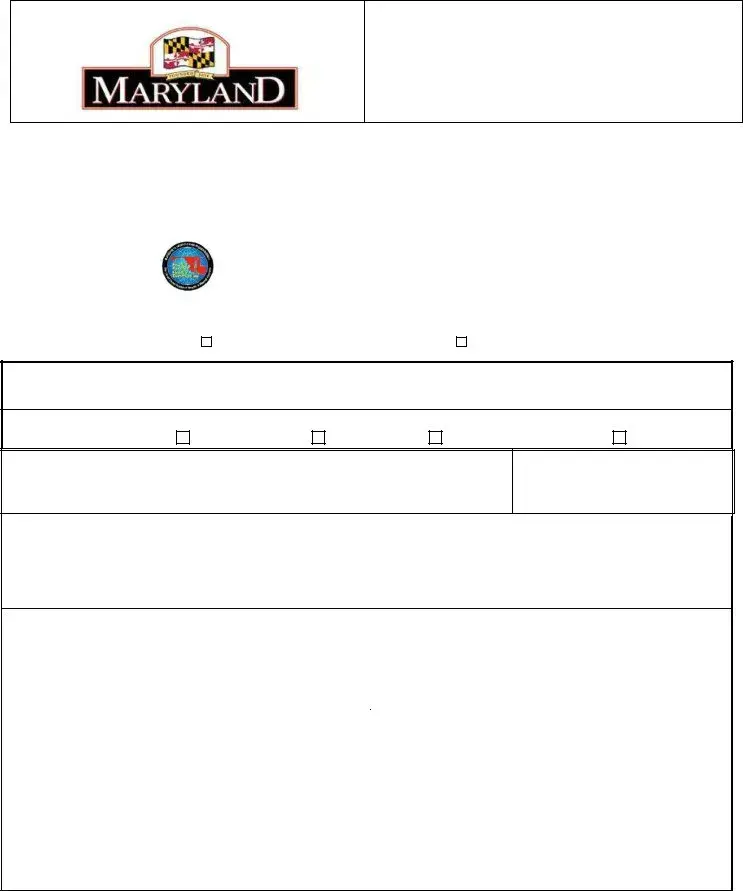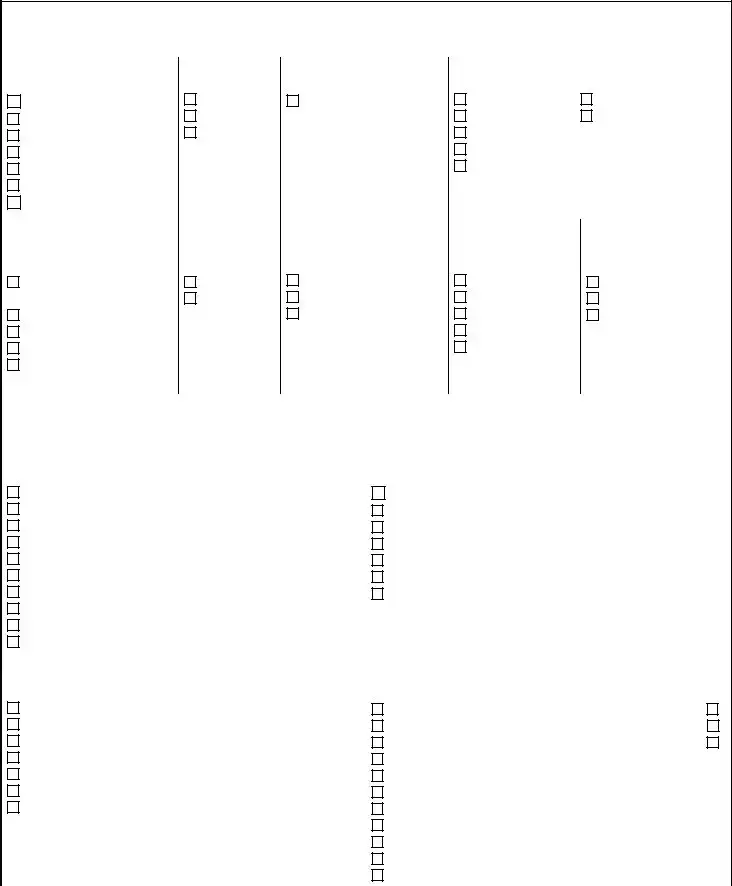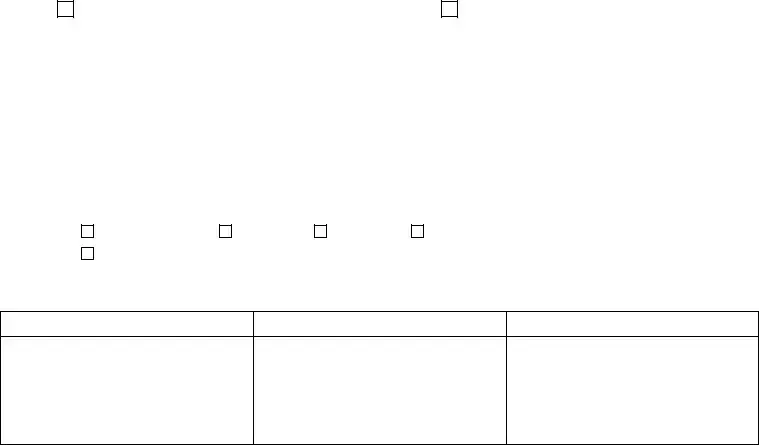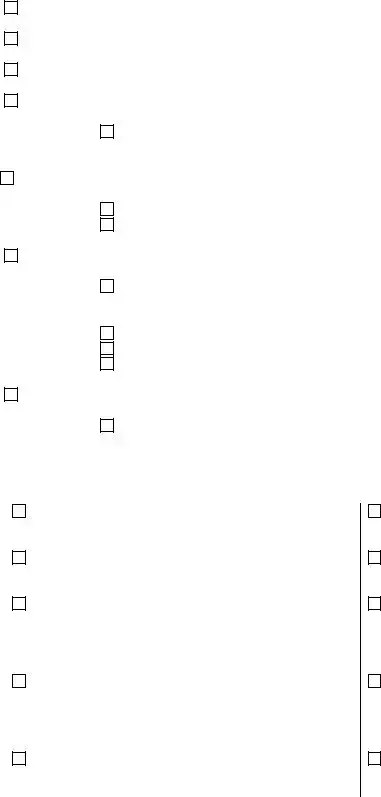Maryland State Compliance Application PDF Template
In the healthcare sector, the integrity and quality of laboratory services are paramount, ensuring accurate and reliable test results that are critical for patient care. In Maryland, the process of maintaining the high standards expected of laboratories is overseen by the Maryland Department of Health and Mental Hygiene's Office of Health Care Quality, which necessitates the completion of the Maryland State Compliance Application form. This comprehensive form is a stepping stone for laboratories in diverse settings, including physician offices, independent references, hospital laboratories, and more, to demonstrate their adherence to state regulations. It is meticulously designed to gather detailed information about the laboratory, including types of tests performed, director credentials, and ownership details, among others. Also, this form indicates the necessity of a review for completeness and compliance before the issuance of a license, further underlining the state's commitment to quality health care services. Importantly, the form alerts applicants to submit no fees until advised, following a thorough review process, to pave the way for transparent financial transactions. Completing this application accurately is crucial, as any inconsistencies or omissions may delay the licensing process, affecting the laboratory's operational capabilities. Additionally, the inclusion of a checklist emphasizes the importance of submitting all required documentation to streamline the approval process. This introductory piece to the application form highlights its role as a critical document that ensures laboratories operate within a framework that safeguards patient health and upholds the highest standards of laboratory practice.
Maryland State Compliance Application Sample

Maryland Department of Health and Mental Hygiene
Office of Health Care Quality – Laboratory Licensing Programs
Spring Grove Center – Bland Bryant Building
55 Wade Avenue, Catonsville, MD 21228
Phone: 410.402.8025 Fax: 410.402.8213
Instructions for Completion of State Compliance Application
***Changes to your current State laboratory license must be submitted on the Laboratory Licensing Change Form. The form can be downloaded on our website at www.dhmh.state.md.us/ohcq ***
It is important that you fill out this application completely, including signatures where required. If the application is incomplete it will delay the licensing process.
Please submit no money at this time. Once your application is reviewed for completeness and compliance with the applicable regulations, you will be issued an invoice for the application fee as well as other fees as outlined in COMAR 10.10.04.02.
Please allow
Once your payment is received, the appropriate license will be issued.
Please review page six of this application, to verify you have the correct supportive documentation.
If you have any questions, please call the Laboratory Licensing Division at (410)
***Important***
***Before submitting your application, please review the
checklist on the last page.***

2
Maryland Department of Health and Mental Hygiene
Office of Health Care Quality – Laboratory Licensing Programs
Spring Grove Center – Bland Bryant Building
55 Wade Avenue, Catonsville, MD 21228
Phone: 410.402.8025 Fax: 410.402.8213
|
|
Date/Amount Paid |
Office use only |
|
State of Maryland |
|
|
|
|
|
Invoice # |
Office use only |
|
|
Department of Health and Mental Hygiene |
|
|
||
|
|
|
|
|
Laboratory Licensing Programs |
|
|
|
|
|
Check # |
Office use only |
|
|
Office of Health Care Quality |
|
|
|
|
|
|
State Permit # |
Applicant, if known please enter |
|
|
|
|
|
|
|
|
CLIA # |
Applicant, if known please enter |
|
|
|
|
|
|
State Compliance Application
Initial Application
Reinstatement
I. Laboratory Information
Type of Laboratory
Physician Office
Point of Care
Independent/Reference
Hospital
Laboratory Practice/ Entity Name
Contact Person Name/Phone Number
Address, City, State and Zip Code |
Email Address |
Fax |
|
|
|
Mailing address if different from above |
|
|
II. Director Information
Director Name |
Degree |
Full Time |
Part Time (hours/week) |
|
|
|
|
Certification by American Specialty Board (Name, Date, Number) |
|
State Medical License Number |
|
|
|
||
|
|
||
III. Laboratory Supervisor/Consulting Supervisor/Manager Information |
|||
|
|
|
|
Name |
Degree |
Full Time |
Part Time (hours/week) |
|
|
|
|
Certification by American Specialty Board (Name, Date, Number)

3
IV. Schedule A – General Permit
*** If you are only performing tests on Excepted list, Schedule B, do not use this section***
Chemistry |
Genetics |
Forensic Toxicology |
Microbiology |
Health Awareness |
Routine |
Routine |
Toxicology: Job Related |
Bacteriology |
Cholesterol/HDL |
Blood Gas |
Molecular |
|
Parasitology |
Other Excepted Tests * |
|
|
|
|
|
Endocrinology |
Cytogenetics |
|
Mycology |
|
|
|
|
|
|
Toxicology: Drugs of Abuse |
|
|
Mycobacteriology |
* Excepted tests under |
|
|
|
Health Awareness require |
|
Toxicology: Therapeutic |
|
|
Virology |
|
|
|
|
a General Permit. |
|
Toxicology: Heavy Metals |
|
|
|
|
|
|
|
|
|
Radioimmunoassay |
|
|
|
|
|
|
|
|
|
Immunohematology |
Hematology |
Molecular Biology |
Pathology |
Immunology |
ABO/Rh/Non Trans- |
Routine |
Nucleic Acid Probes |
Histopathology |
General Immunology |
fusion/Transplant |
Coagulation |
PCR Amplifications |
Dermatopathology |
Syphilis Serology |
ABO/Rh |
|
Recombinant Nucleic Acid |
Oral Pathology |
Histocompatability |
Antibody Detection |
|
Techniques |
|
|
Antibody Identification |
|
|
|
|
Compatibility Testing |
|
|
|
|
|
|
|
||
|
V. Schedule B – Excepted Tests * |
|
||
*Note: Not all tests excepted by Maryland regulations are waived by CLIA. You can check the test categories for CLIA at http://www.accessdata.fda.gov/scripts/cdrh/cfdocs/cfclia/search.cfm
Chemistry |
|
Hematology |
|
|
BNP |
|
Fern Test |
|
|
Dipstick Glucose |
|
Hematocrit |
|
|
Dipstick Urinalysis |
|
Hemoglobin |
|
|
Dipstick Microalbumin & creatinine, urine |
|
Nitrazine Test |
|
|
Fructosamine (whole blood) |
|
Semen analysis, qualitative |
|
|
Glucose (FDA Home Device) |
|
Sickle Cell Testing |
|
|
Hemoglobin A1c (Glycohemoglobin) |
|
CLIA Waived PT/INR |
|
|
Microscopic Urinalysis |
|
|
|
|
Urine or saliva drug or alcohol for approved counselors |
|
|
|
|
CLIA Waived blood lipids for cholesterol, HDL, LDL, |
and |
|
|
|
Triglycerides |
|
|
|
|
|
|
|
|
|
Immunology |
|
Microbiology |
|
|
Bladder marker, |
|
Dermatophyte Screen |
Trichomonas vaginalis antigen |
|
H.Pylori (whole blood) |
|
Fecal Fat |
Bacterial Sialidase |
|
Heterophyle AG (whole blood) |
|
Gram Stain |
Adenovirus antigen eye fluid |
|
Mono Slide Test |
|
Group A Strep Screen |
|
|
NMP Bladder Marker, qualitative |
|
Influenza Antigen (nasal or throat swab) |
|
|
Rheumatoid Factor |
|
KOH Preparation |
|
|
Urine Pregnancy Test |
|
Occult Blood |
|
|
|
|
Occult Blood, gastric |
|
|
|
|
Pinworm Prep |
|
|
|
|
Urine Colony Count (no ID) |
|
|
|
|
Wet Mount |
|
|
|
|
|
|
|

4
VI. Mandatory, You Must List Testing Instrumentation and Test Kits Used in the Laboratory
***Please also include test discipline/subdicipline (e.g.
__________________________________________ |
____________________________________________ |
__________________________________________ |
____________________________________________ |
__________________________________________ |
____________________________________________ |
__________________________________________ |
____________________________________________ |
__________________________________________ |
____________________________________________ |
__________________________________________ |
____________________________________________ |
__________________________________________ |
____________________________________________ |
VII. Proficiency Testing
I am not enrolled
I am enrolled (complete below)
Name of Company |
Discipline |
__________________________________________ |
____________________________________________ |
__________________________________________ |
____________________________________________ |
__________________________________________ |
____________________________________________ |
__________________________________________ |
____________________________________________ |
VIII. Ownership Information
A. Type of Entity
Sole Proprietorship |
Partnership |
Corporation |
Unincorporated Association |
Other (Specify) _____________________________________
B.This section is MANDATORY, application will be returned if left blank. Social Security Number is unacceptable
Name
Address
EIN Federal Tax ID
IX. Attestation
I certify that the information provided in this application is true and complete, understanding that any knowing and willful false statement or representation, or failure to fully and accurately disclose the requested information in this application, may be prosecuted under applicable federal or State laws, may lead to a denial, suspension or revocation of the medical laboratory license for this entity, or could result in termination of participation in State or federal reimbursement programs. I further understand that compliance with State laws may not assure compliance with federal laws.
______________________________________________________ |
________________________ |
Signature of Laboratory Director |
Date |
5
For Informational Purposes Only
Examples of Testing for Schedule A- General Permit (Do Not Circle)
Chemistry
Alkaline Phosphatase
Amylase
Blood Lead
Digoxin
Iron
Lipase
Phenytoin
Troponin
TSH
Vitamin D
Genetics
Chromosome Analysis
FISH Studies (Neoplastic and Congenital)
Fragile X Screen
Gaucher Disease (GBA) 8 Mutations
Y Chromosome Deletions
Forensic Toxicology
Job Related Alcohol
Job Related Drugs of Abuse
Microbiology
AFB Smear
Bacterial Culture
Blood Culture
CSF Bacterial Antigen
Fungus/Yeast Culture
Ova and Parasite
Sensitivity Testing
Viral Culture
Hematology
APTT
CBC
Differential
Fetal Hemoglobin
Fibrinogen
INR
Prothrombin Time
Reticulocyte Count
Sedimentation Rate
Molecular Biology
Adenovirus PCR
BD Affirm Probe Test
Chlamydia PCR
EBV PCR
HCV Genotyping
HIV Drug Resistance Genotyping
HIV Viral Load
Pathology
Dermatopathology
Fine Needle Aspirations
Grossing
Histopathology
Oral Pathology
Other Cytology
Pap Smear Interpretations
Immunology
Epstein Barr Antibodies
GM1 Antibody
Hepatitis B Surface Antibody
Hepatitis B Surface Antigen
Herpes Antibody
HIV Antibody
Lyme Antibody
Non Transplant Related Histocompatibility

6
To prevent a delay in processing your application please check to make sure all of the following are included:
Completed application with each section completely filled out
Signature of Medical Director must match Director name in section II of application
If the status of your CLIA certificate is changing, a completed CMS 116 form must be submitted
Director Qualifications
Copy of CV, Diploma (highest degree), ECFMG (if applicable), board certification for MD or PhD (if applicable)
Technical Supervisor Qualifications (for the discipline of HISTOLOGY)
Copy of American Pathology Board certification in Anatomical Pathology
Copy of Maryland (Board of Physicians) license to practice medicine
Genetics Testing
Copy of Technical Supervisor’s diploma (must be MD, DO or PhD), board certification from the American Board of Medical Genetics or 4 years of verified (not
Copy of Test Menu
Copy of a Validation Study of one test (includes a summary and raw data)
Letter from Director documenting that the lab does not perform “Direct to Consumer” testing
Certificate of Accreditation Laboratories
Copy of enrollment verification from the designated accrediting organization
____________________________________________________________________________________________
Applicants Located in Maryland
Completed CLIA application in agreement with State application
Copy of Director’s Maryland (Board of Physicians) license to practice medicine
For High Complexity Laboratories: Documentation
of training, education and previous experience
that meets CLIA Sec. 493.1443: Standard:
Laboratory Director Qualifications
For Moderate Complexity Laboratories:
Board Certification or Documentation of 20 CME from approved programs for Medical Director that meets CLIA Sec. 493.1405
Documentation of licensure as a practitioner seeking a Letter of Exception (midwife, nurse practitioner, PA, chiropractor, podiatrist, dentist)
Applicants Located Out of State
Copy of CLIA certificate and State Laboratory License, if applicable
Copy of most recent survey, which includes cited deficiencies and corrective actions
Copy of Director’s State license to practice medicine from the State where the laboratory is located
Documentation of training, education and previous experience that meets CLIA Sec. 493.1443: Standard: Laboratory Director Qualifications
Proof of most recent participation in annual GYN cytology proficiency testing
File Breakdown
| Fact Name | Details |
|---|---|
| Application Purpose | The Maryland State Compliance Application form is used for changes to an existing state laboratory license and must be submitted on the Laboratory Licensing Change Form available on the Maryland Department of Health's website. |
| Application Requirements | Applicants must fill out the form completely, including signatures where required, to avoid delays in the licensing process. No payment should be submitted with the application; invoices will be issued once the application is reviewed. |
| Processing Time | The permit processing and invoicing may take approximately 6-8 weeks from the time of application submission. |
| Governing Laws | The application process and requirements are governed by regulations outlined in COMAR 10.10.04.02, ensuring compliance and oversight by the Maryland Department of Health and Mental Hygiene's Office of Health C
Steps to Filling Out Maryland State Compliance ApplicationCompleting the Maryland State Compliance Application form is a critical step in ensuring that a laboratory operates legally within the state. This process involves detailed documentation and verification to meet state requirements. It is important for applicants to provide accurate and complete information to avoid delays in licensing. The instructions below guide you through each section of the form, ensuring thorough completion. Remember to refer to the checklist on the last page of the application before submitting to ensure all necessary documents and information are included.
After completing the form, review it carefully to ensure all information is accurate and no sections are missed. Submit the application to the Maryland Department of Health and Mental Hygiene Office of Health Care Quality – Laboratory Licensing Programs using the provided contact details. Remember, the submission of this form does not require any fees initially; an invoice will be sent after the review. Processing and invoicing might take 6-8 weeks, so planning accordingly is advised. More About Maryland State Compliance ApplicationWhat is the purpose of the Maryland State Compliance Application form?This form is used for applying for or reinstating a laboratory license under the auspices of the Maryland Department of Health and Mental Hygiene Office of Health Care Quality – Laboratory Licensing Programs. It ensures laboratories operating in Maryland comply with the state’s health and safety regulations. How long does the permit processing take?After submitting a fully completed application, permit processing and invoicing take approximately 6-8 weeks. It is essential that all parts of the application are filled out correctly and completely to avoid delays. Is there a fee associated with the application, and when should it be paid?No payment should be submitted with the application. An invoice for the application fee, along with any applicable additional fees outlined in COMAR 10.10.04.02, will be issued once the application has been reviewed for completeness and compliance. Payment instructions will be provided with the invoice. What are Excepted Tests under Schedule B, and how do I know if my tests are excepted?Excepted Tests under Schedule B are specific laboratory tests that are exempt from certain regulatory requirements in Maryland, though they may not be waived by CLIA regulations. To verify if specific tests conducted by your laboratory are considered excepted, review the CLIA test categories available at http://www.accessdata.fda.gov/scripts/cdrh/cfdocs/cfclia/search.cfm . Schedule B in the application form also lists common examples of Excepted Tests. What documentation is required when submitting the application?To ensure your application is processed without delay, review the checklist on the last page of the application form. Required documentation typically includes:
Failure to provide complete and accurate information may result in processing delays or application rejection. Common mistakes
Documents used along the formWhen preparing to submit the Maryland State Compliance Application form, it's important to have all necessary documents ready to ensure a smooth and efficient processing. Along with the application, there are several forms and documents that are often required to complete the submission process. These documents play a crucial role in verifying the information provided and demonstrating compliance with state regulations.
Each document plays a significant role in complementing the Maryland State Compliance Application. Ensuring that all supporting documents are accurate and up-to-date aids in the timely approval of the application. It is advisable to review the requirements thoroughly and prepare all necessary documentation before submitting the application to the Maryland Department of Health Office of Health Care Quality. Similar formsThe Maryland State Compliance Application form is similar to other regulatory compliance forms required for laboratory operations, such as the Clinical Laboratory Improvement Amendments (CLIA) application and the College of American Pathologists (CAP) accreditation application. These forms share the function of ensuring that laboratories meet specific standards of operation, quality control, and regulatory compliance. Although the specifics of each application vary according to the overseeing body's requirements, they all necessitate detailed information on laboratory practices, personnel qualifications, types of tests conducted, and quality assurance measures. For instance, the CLIA application focuses on the laboratory's compliance with federal standards for laboratory testing. It requires information similar to the Maryland State Compliance Application, such as laboratory and director details, but it places a strong emphasis on the categorization of tests (waived, moderate, or high complexity) based on the potential risk to public health. Both applications necessitate the laboratory to prove their capability in providing accurate and reliable test results, but the CLIA application specifically addresses compliance with federal testing standards and might involve more in-depth scrutiny of the laboratory's testing procedures and error rates. On the other hand, the CAP accreditation application lays emphasis on quality improvement practices alongside compliance. It is similar to the Maryland State Application in that it requires laboratories to provide detailed profiles of their operations, including personnel qualifications, equipment, and test menus. However, CAP also requires evidence of participation in proficiency testing, detailed quality control procedures, and quality improvement initiatives, making it more focused on the laboratory's continuous efforts to enhance testing accuracy and reliability. While the Maryland State Compliance Application ensures the laboratory meets state-specific regulatory requirements, the CAP accreditation process aims at elevating the overall standards of laboratory medicine through rigorous peer review and continuous monitoring. Dos and Don'tsWhen filling out the Maryland State Compliance Application form, there are several key actions you should take to ensure the process is smooth and error-free. Equally, there are things you should avoid to prevent potential delays or issues with your application. Here are nine essential dos and don'ts:
Following these guidelines will help you ensure that your application is filled out correctly and efficiently, reducing the likelihood of delays or complications in the processing of your Maryland State Compliance Application form. Misconceptions
Key takeawaysWhen applying for a Maryland State Compliance Application for laboratory licensing, understanding the key components and requirements is crucial. Here are nine essential takeaways to guide you through the application process:
By carefully considering these key takeaways and ensuring the completeness and accuracy of your application, you can facilitate a smoother licensing process. This careful preparation not only aids in compliance with state regulations but also lays a solid foundation for your laboratory's operational success. Common PDF TemplatesMaryland Form 502 - Refundable credits, such as the Earned Income Credit, are adjusted on the 502X if applicable. Md State Tax Form - Ensure you file Form 500E to avoid rushing your Maryland corporation's tax return. |